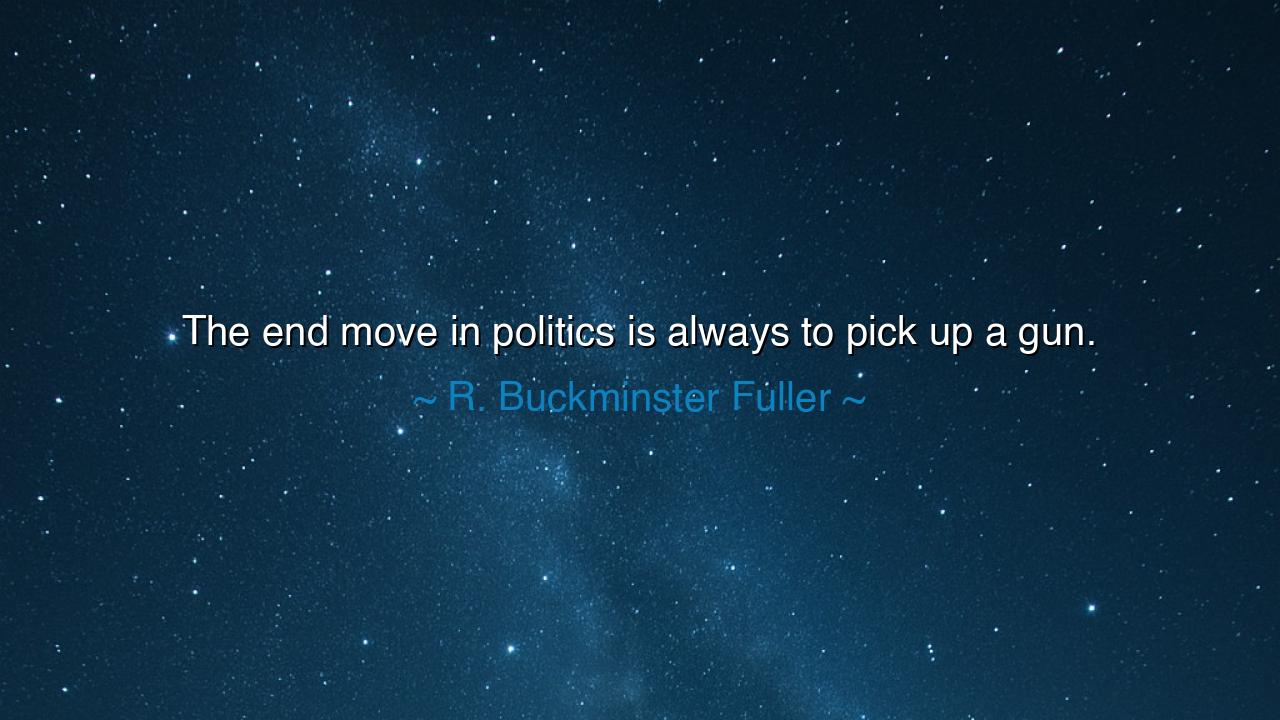
The end move in politics is always to pick up a gun.






R. Buckminster Fuller, seer of design and dreamer of utopia, once warned with stark truth: “The end move in politics is always to pick up a gun.” In this grim utterance he strips away the masks of diplomacy, revealing the shadow that lies behind all power. For laws, debates, and elections may weave their arguments, but when authority is challenged to its core, it is not persuasion but force that decides. Fuller, a man who sought harmony in architecture and society, spoke here not with hope but with sorrow, knowing that beneath the ornaments of politics rests the brutal language of the sword.
The origin of this saying rests in Fuller’s lifelong search for alternatives to violence. He envisioned new technologies, geodesic domes, and global cooperation as ways to free humanity from scarcity and war. Yet, in observing history, he saw that when the structures of governance collapse, leaders fall back upon the ancient tool of compulsion: the gun. Thus his words serve as both diagnosis and warning—politics without justice and imagination inevitably degenerates into conflict, for those who hold power rarely surrender it willingly.
History bears witness in countless examples. When the fragile democracy of Weimar Germany faltered, it was not ballots that settled the fate of the nation, but the rise of Hitler’s armed Brownshirts. Debate dissolved into violence, and politics ended in war. So too in the American Civil War, when decades of compromise and argument failed, the question of slavery was answered not in congress but on the battlefield. These moments prove Fuller’s bleak insight: when words fail, politics reaches for weapons.
Yet his statement is not only condemnation; it is a call to vigilance. For if the end move of politics is violence, then the true duty of citizens and leaders is to prevent the game from reaching that end. Dialogue, compromise, and innovation are not luxuries, but necessities if humanity is to escape the cycle of blood. Fuller, who dreamed of a world where technology would free us from competition, issued this warning so that we might build a politics of peace before the gun is drawn.
Therefore, O children of the future, hear the wisdom beneath his lament. The gun is not destiny, but the failure of imagination. If politics is allowed to decay into mere struggle for dominance, it will end in violence, as it always has. But if it becomes a field of vision, where leaders seek not only to rule but to create abundance for all, then perhaps the end move need never be made. For the truest victory is not to win by the gun, but to render the gun unnecessary.






HNDao Thi Hong Nhung
Fuller’s perspective challenges us to confront the darker side of political power—the use of violence when all other options are exhausted. But what if political systems evolved beyond this 'end move'? How can we rethink the concept of power, so that it doesn’t always culminate in force? Could we build systems that value dialogue and compromise over coercion and violence, or is this idealistic thinking in the face of political realities?
KLTrieu Khanh Ly
Buckminster Fuller’s comment seems to echo the idea that, in extreme circumstances, politics turns violent when negotiation fails. But is this always true, or is it a reflection of systemic issues in certain governments? Is there a way for modern political structures to prioritize non-violence, or are we still entrenched in systems where power struggles inevitably lead to violent outcomes? Can peaceful transitions of power ever become the norm?
TKLe Thi Kieu
This quote by Fuller raises an uncomfortable question: does the nature of political power inevitably lead to violence in the end? It makes me wonder, are we seeing this play out in today’s political climate, where the threat of force often lingers in the background? How can societies prevent the escalation of political tension to the point where armed conflict seems like the only solution?
TNNguyen Tuong Nghi
Fuller’s quote paints a bleak picture of politics, implying that violence is the final recourse in resolving conflicts. But does this apply to all political situations, or is it more of a reflection of certain historical contexts where power was consolidated through force? Is there a more constructive way for political leaders to resolve issues without resorting to violence, and if so, what does that look like?
KNkhanh nguyen
Buckminster Fuller's statement is a stark commentary on the relationship between politics and violence. It seems to suggest that when all other avenues fail, political conflict inevitably leads to armed confrontation. But is this really true in modern politics? Can we avoid this 'end move' by focusing on diplomacy and peaceful resolutions, or are there political systems where conflict is the only way to bring about change?